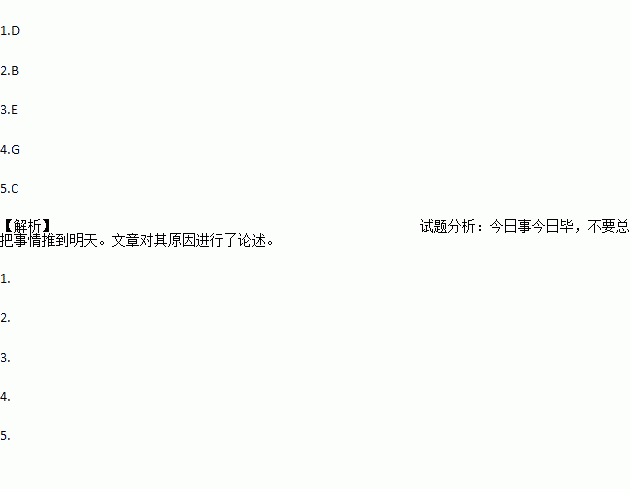题目内容
There is an old Spanish Proverb which states, “Tomorrow is often the busiest day of the week”. 1.I’d say, too many. Our dreams should not, and cannot wait. We have to go for them now! Here’s why.
1. 2.
Nobody likes to talk about death, but the reality is – everybody is going to die at one point. None of us know the day, or the hour. Therefore, today is all we have. Don’t go to your grave with unfulfilled dreams. Make the decision to go after every dream, big or small right now.
2. The world is waiting for your gift
I know this may be hard to believe, but the world is waiting for YOU! Yes, YOU! 3.Sure, other people may be able to sing. But they’ll never be able to sing exactly like you. Sure other people can write, but they’ll never be able to write from the same perspective in which you write. Don’t deprive the world of your gift. It’s the oxygen that we need to survive. Thus, it is your responsibility to figure out exactly what your gift is, and use it to better your life and the lives of those around you.
3. 4.
You can dream about writing the great American play that you want, but it’s never going to happen unless you actually put pen to paper. You can dream about finding a cure for cancer, but it will never happen unless you actually go to school to become equipped with the necessary tools to find that cure. 5. They require you to get your head out of the clouds, and actually do the work to make them happen. Get to it!
A. You can‘t let fear win.
B. Tomorrow is not promised.
C. In other words, dreams don’t work unless you do.
D. How many times have we put off our dreams until tomorrow?
E. You were born into the world with a unique gift, which nobody on this earth can copy.
F. Possibilities you never knew existed are waiting on you.
G. Unless you take the first step, your dreams will never come true.


 information
information ther. It was ____ not to have to stress about piano anymore. But something was ______ inside of me I was empty inside.
ther. It was ____ not to have to stress about piano anymore. But something was ______ inside of me I was empty inside.